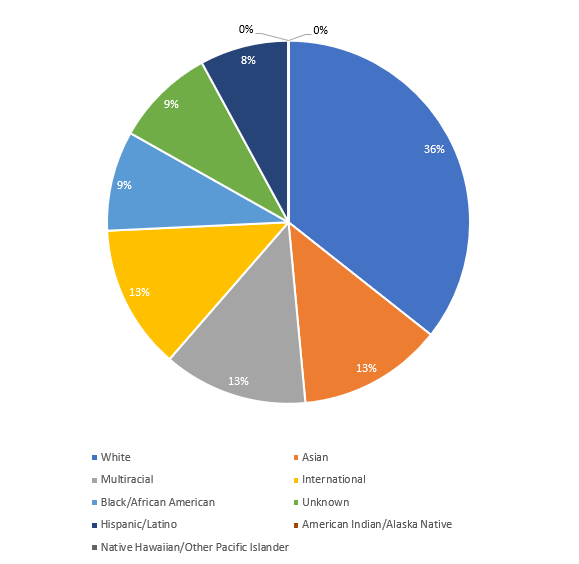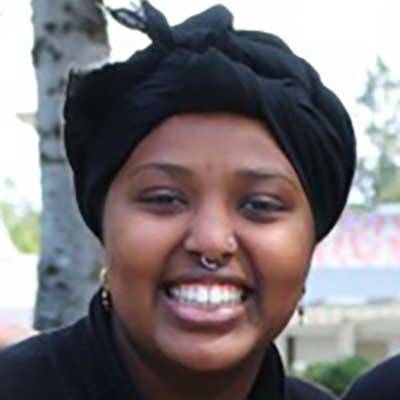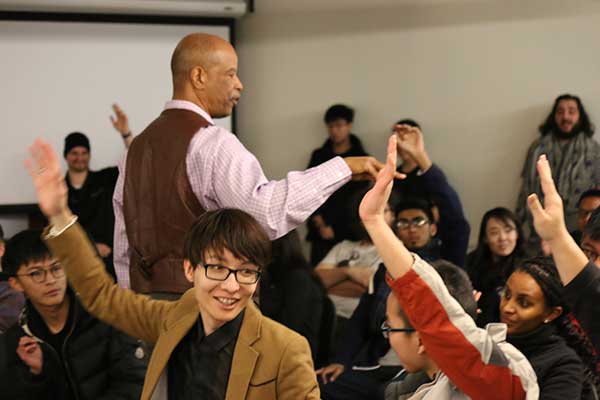Diversity, Equity, Inclusion and Accessibility at Shoreline

Shoreline Community College recognizes that equity and diversity in the academic environment fosters cultural awareness, promotes mutual understanding and respect, and provides suitable role models for all students. We are committed to a campus climate and culture where all community members feel safe, experience a sense of belonging, and their overall well-being is supported through authentic and engaged relationships.
To people of all races, ethnicity, national origins, religions, ages, genders, sexual orientations, marital status, veteran status, abilities and disabilities: You are welcome here.
Shoreline by the Numbers
Around 8,000 students attend Shoreline Community College each year. Each person has their own unique story and identity. These identities shape who we are and how we experience Shoreline... whether you are first in your family to attend college (first generation), are part of a socially marginalized community, identify as a student of color, or hold any number of intersecting experiences. Here are just a few of the ways that Shoreline students identify themselves.

See more Shoreline stats on our Quick Facts page
A Community of Care and Support
Shoreline strives to engage its campus community around equity and inclusion and prioritizes its work to serve the multicultural needs of its diverse student community.
We recognize that our students come from a wide array of lived experiences and are committed to providing the care and support all students need to become successful in their academic endeavors. All-gender restrooms, a Benefits Hub that provides financial assistance and food access, the Counseling Center, and residence assistance are just a few services that address our communities’ needs.
Additional support services include:
- Student Accessibility Services (SAS)
- Gender Equity Center
- Multicultural Center
- Veteran & Military Student Services (VMSS)
I remember coming here for the first time and specifically seeing the Trans Day of Remembrance and Black Lives Matter art installation and knowing there was a community here that would have my back.
 Azeb Tuji
Azeb TujiClass of 2017
Curricula Designed with Equity in Mind
When students see their identities reflected in their instructors and their learning materials, their performance increases and they have a better shot at success. When students are surrounded by those that they can relate to, they are more likely to reach out when needing assistance.
Knowing this, Shoreline faculty and staff are continually trained in how to communicate, empathize, and understand our students, and how to incorporate equity principles in their teachings and everyday interactions. Each year, students are given a day off and the campus is closed for Employee Day of Learning. This is an entire day centered on diversity, equity, inclusion and accessibility that allows faculty and staff members to focus on updating their skills and renew their commitment to creating an inclusive campus culture of support and care.
These ideas trickle down through each touchpoint students interact with when they come to Shoreline – from the enrollment staff they work with to get started at the College, to the advisors they consult to keep on track in their program, to the instructors and the content they create that students utilize to learn.

Land Acknowledgement
Shoreline Community College acknowledges that we occupy the ancestral lands of the Coast Salish Peoples, in particular the Duwamish Tribe. We see you, respect your right to sovereignty and self-determination, and are committed to being better listeners, learners, and in lifting indigenous voices.
The college grounds served as a special place for gathering traditional foods in ways that increased the bounty of the land by the Duwamish Tribe. Without the Duwamish Nation protecting and honoring all living and spiritual beings residing in these environments, the land would not be as bountiful as it is today. We are called to continue that stewardship as we write the next chapter of our college.
Learn more about Shoreline's land acknowledgement
Shoreline's Community Standard
"Injustice anywhere is a threat to justice everywhere. We are caught in an inescapable
network of mutuality, tied in a single garment of destiny. Whatever affects one directly,
affects all indirectly..."
- Rev. Dr. Martin Luther King, Jr.
Shoreline Community College is a place for students, employees, and the community to pursue excellence in education in an environment dedicated to equity, inclusiveness, and self-reflection. We value respectful, dynamic interactions, and lively discussion. We strive to create an environment where everyone is supported and valued. Shoreline Community College does not tolerate hateful, violent, or discriminatory actions that target any person or group based on their beliefs, customs, identity, or affiliations. When one of us is diminished, all of us are diminished.
Learn more about Shoreline's Community Standard
What DEIA Means at Shoreline
The glossary below provides a list of commonly used words related to diversity, equity, inclusion and accessibility efforts at Shoreline Community College. This glossary may be expanded and/or updated as the College continues to grow and support equity and inclusion at a systemic level.
|
Community-Based Organization |
A nonprofit organization (which may include faith-based), that is representative of a community or a significant segment of a community focused on the organizational development of locally based social welfare through the coordination of public and private agencies. |
|
Communities of Color |
Communities whose affinity is based on a primary racial identity and/or shared racial characteristics among members, most often used to describe communities of people who do not identify as white/Caucasian. |
|
Cultural Appropriation |
The non-consensual act of adopting or portraying elements of a systemically nondominant culture or identity by members of the dominant culture for commodification or profit without acknowledgement of source or respect for its value in the original context. |
|
Cultural Competence |
An ongoing developmental process to advance individual or group ability to understand, appreciate, and effectively interact with people from cultures or belief systems different from one's own. |
|
Diversity |
Typically refers to the wide range of identities within the broad categories of race, ethnicity, gender, age, national origin, religion, disability, sexual orientation, socioeconomic status, education, marital status, language, veteran status, physical appearance, etc. |
|
Equity |
The act of developing, strengthening, and supporting outcome fairness in resource systems and procedures with a focus on eliminating barriers that have impacted historically marginalized and/or underserved groups. |
|
Historically Marginalized Communities |
Groups who have historically faced barriers to civic engagement and resource access, and/or have been historically side-lined from power, because of factors such as race, wealth, immigration status, sexual orientation, etc. |
|
Inclusion |
The ongoing and adaptable action of providing equitable access, opportunities, and resources for systemically non-dominant groups or individuals in a way that acknowledges and shares power. |
|
Low-Income Communities |
U.S. Census tract where 51 percent of the residents are low-income families with an annual income that does not exceed 80 percent of the median income for the area or that does not exceed 80 percent of the median income for the State, whichever is higher, as most recently determined by U.S. Department of Housing and Urban Development. |
Responding to Bias and Discrimination
If you encounter, witness, or suspect a bias incident on campus, you are encouraged to submit a report using the bias incident form. We are here to listen and to provide you with support. By working together, we strive to create a more inclusive, welcoming, and safe campus for all students, faculty, and staff.